Ten Years of Feeding the Pack
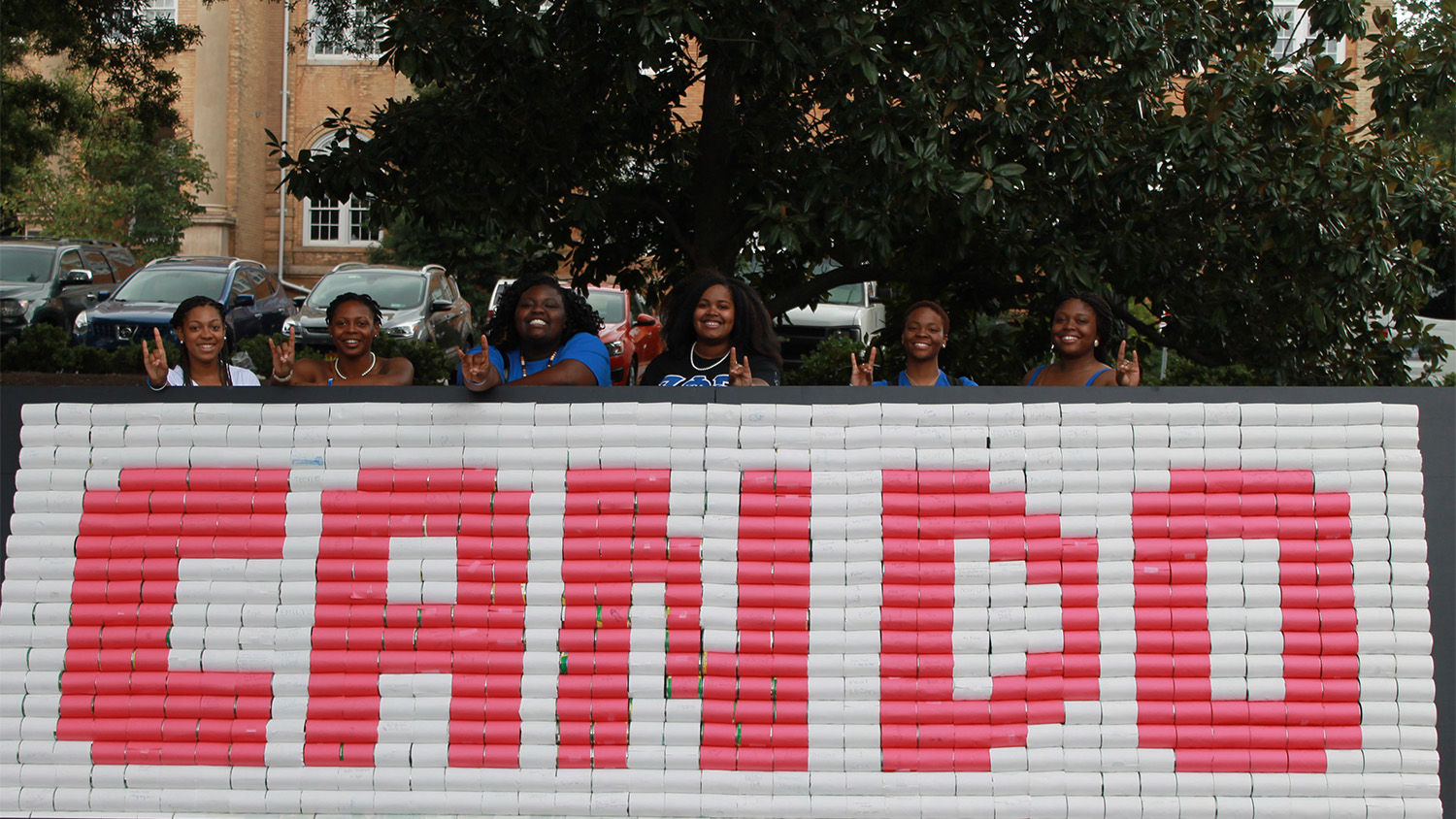
On Nov. 14, 2012, NC State’s Feed the Pack food pantry opened its doors for the first time. The original space in 379 Harrelson Hall was a former classroom, and the initial funding for shelving came from Rodgers Construction — the company that built Talley Student Union. The NC State community donated nearly all the canned goods on those shelves, and the pantry distributed 342 lbs. of food in its inaugural year.
In 2022, the pantry has distributed 113,358 lbs. of food — and counting. Thanks to the addition of refrigerators and freezers, its offerings have expanded to include fresh produce, baked goods and health and household items. The volume of donations has also drastically increased , thanks to alumni support and new partnerships with community organizations like the Food Bank of Central and Eastern North Carolina, Agroecology Education Farm, Food Lion, Inter-Faith Food Shuttle and other local restaurants and businesses.
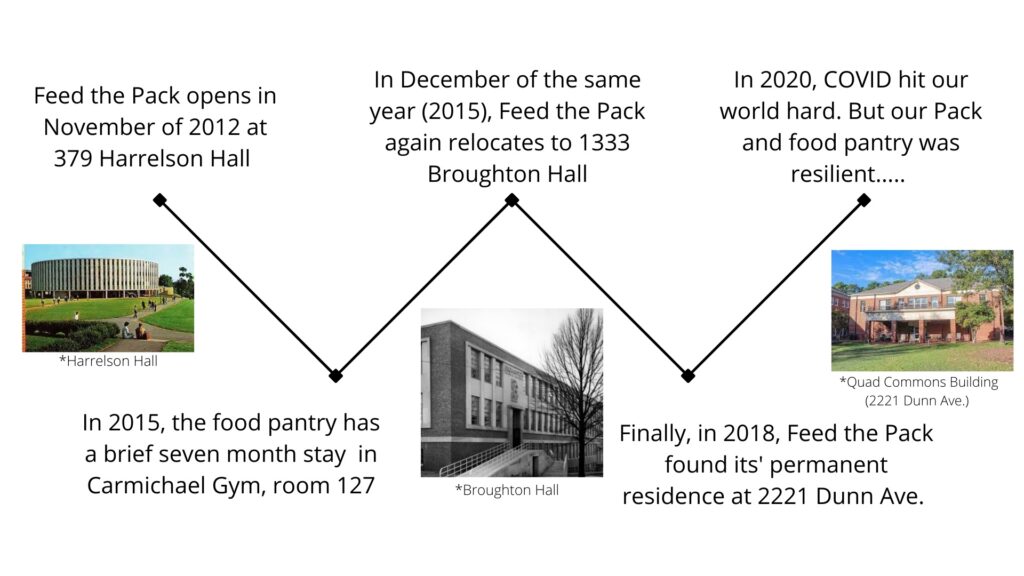
Volunteers have been crucial to the pantry’s success over the years.
“We could not operate or do any of the things we do without all of our volunteers,” said Rose Krebs, program coordinator for Feed the Pack. “Our students have also been so pivotal in the growth of the pantry as we transitioned from a student organization into a university-wide program.”
How it Started
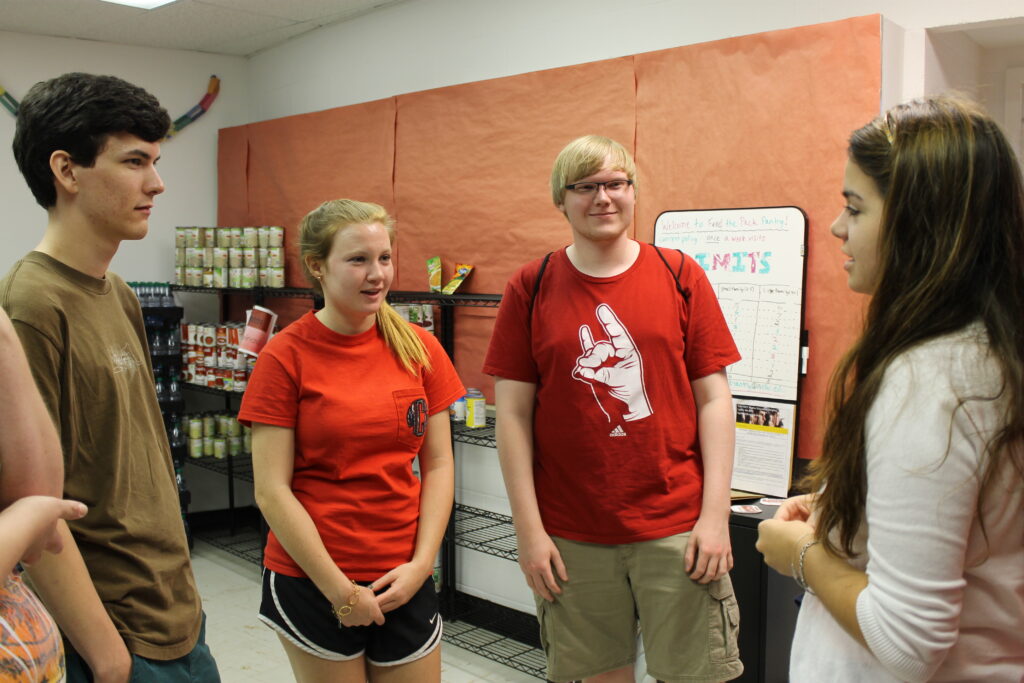
Before Feed the Pack’s opening in November 2012, students, faculty and staff from across the university began recognizing the amount of food insecurity experienced at NC State. In spring 2012, the university formed a steering committee to research other college food pantries and determine the feasibility of opening one at NC State. After seeing the need for a pantry at NC State, the committee formed a student leadership team to run the pantry’s operations. The steering committee soon became an advisory board, and continues to provide guidance and support for the pantry.
Caitlin Cohn (English ’12) was one of the student advisors on the committee, helping to provide student perspective and gathering research about students’ interests and needs from such a program.
“I got involved with Feed the Pack when it was first even being thought of as a concept to explore,” Cohn said. “Dr. [Richard] Tyler-Walker at the Counseling Center knew I had a passion for service and being involved in food insecurity work. He had heard talks of starting a food pantry on campus and brought me into the conversation with the initial group of planners who were exploring the idea, conducting research, discussing logistics, and envisioning the pantry’s potential. Feed the Pack officially opened its doors after I graduated but I am honored to have been part of the original planning group and to have represented my fellow students at the time.”
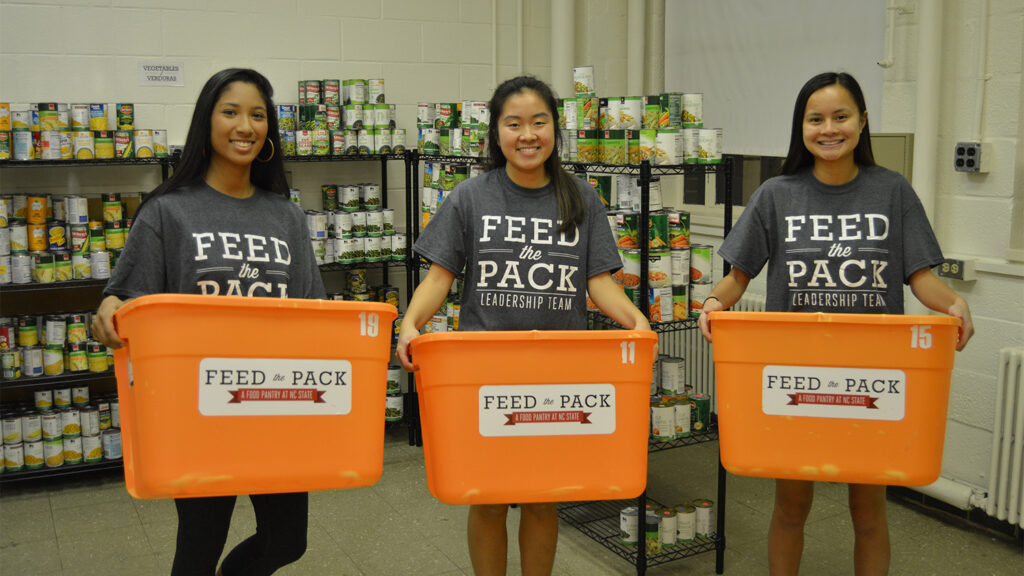
Cohn is now the director of network strategy for the Food Bank of Central and Eastern North Carolina and works to provide food and knowledge resources to a network of over 650 partner agencies, such as soup kitchens, shelters and food pantries — including Feed the Pack.
“From researching and envisioning the potential of an on-campus pantry to now strategizing big picture initiatives for a network of 650 organizations, the time spent launching Feed the Pack supplied me with the skills and compassion to build a career centered around service,” Cohn said. “My hope for Feed the Pack is for it to continue to grow in its intentionality, accessibility and the ways it is community-centered, to always provide a dignified experience to anyone coming through its doors, and to remember and honor that food holds so many meanings in our lives: hope, tradition, nutrition, community, fun, comfort and so much more.”
Lisa LaBarbera-Mascote, senior director of NC State Campus Community Centers, was also a founding member of Feed the Pack. Ten years later, she is proud of the work Feed the Pack has done to elevate the visibility of food insecurity as an issue on campus and alleviate that need.
“As a staff member working with the Campus Community Centers, we hear about the needs of students every day,” she said. “We know the need and the stigma around food insecurity are very real. Continuing to partner with Feed the Pack has also been a wonderful opportunity to begin satellite locations in some of our centers and support the amazing work of Feed the Pack. While my hopes are for a future where Feed the Pack is not needed on campus, I recognize that we are not there yet. Feed the Pack is an excellent example of community care and support here at NC State.”
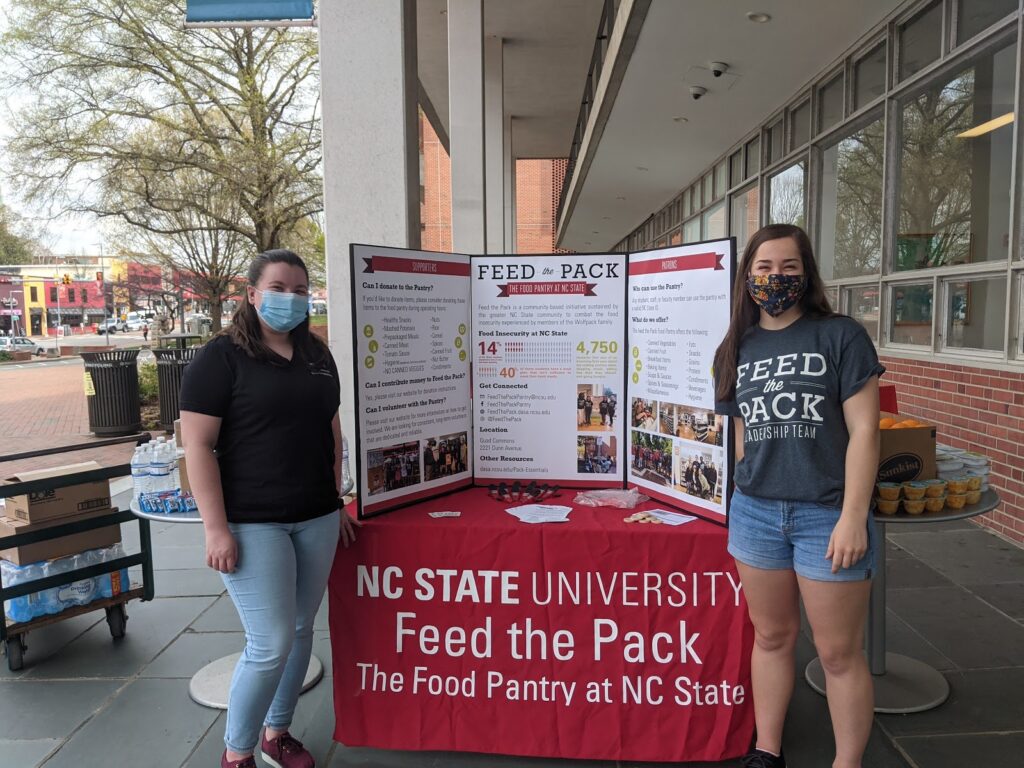
How It’s Going
Throughout its existence, Feed the Pack’s mission has been to help meet the food needs of all members of the NC State community with dignity and respect. Since 2012, over 23,000 students and 9,400 faculty and staff have visited the pantry at its various homes in Harrelson Hall, Carmichael Gym, Broughton Hall and now Quad Commons. More than 459,000 lbs. of food has been distributed in that same time.
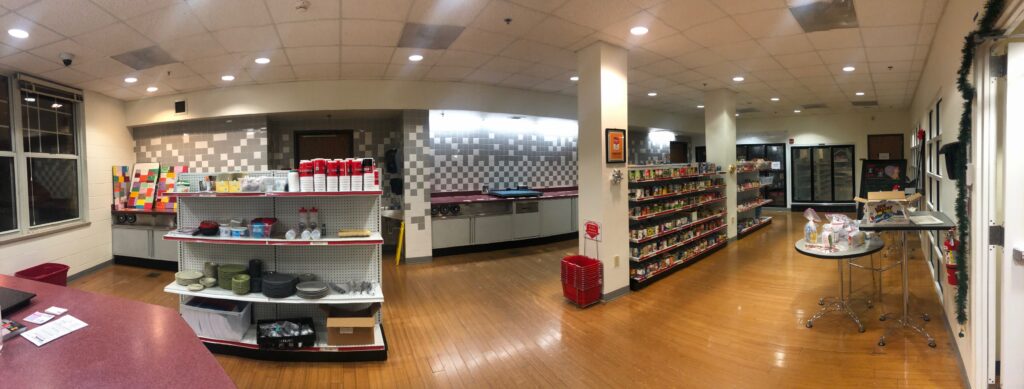
Rose Krebs initially got involved with Feed the Pack as a student volunteer in 2017 and is now the program coordinator. Over her five years with the organization, she has witnessed substantial growth, particularly in alumni engagement and community partnerships. Since 2012, more than 421,000 lbs. of food has been received through more than 5,000 donations.
With the addition of refrigeration and freezers in 2020, the pantry was able to move closer to its goal of providing more fresh and healthier food. Since that time, the pantry has been able to purchase an average of 500 lbs. of produce every week.
“That was a big achievement for the team at that time,” Krebs said. “That was something we had been working on for years, and it wasn’t until COVID happened that we were able to actually partner with dining and get it off the ground and running.”
Another of Feed the Pack’s goals has been to create an experience where patrons feel respected and have the dignity of choice when they come to the pantry. Because of this, visitors to the pantry are able to shop for the items they need just like in a grocery store. One partnership that has enhanced the overall experience is the Flower Shuttle, a group of Raleigh community volunteers who bring flowers and plants donated from local stores to the pantry each week.
Looking Ahead
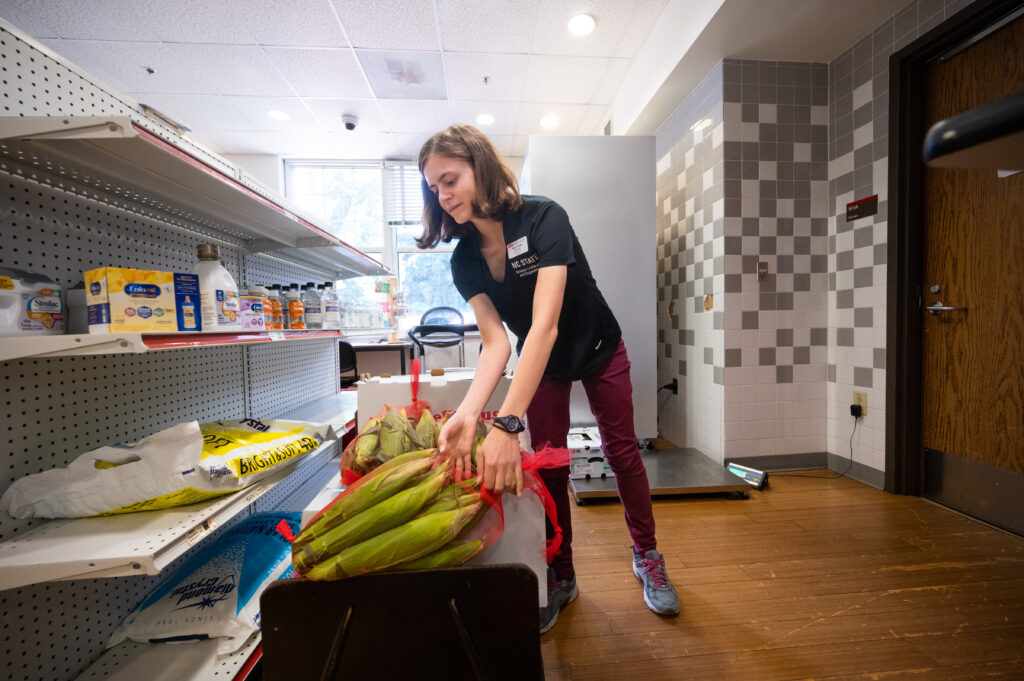
In recognition of its 10th anniversary, Feed the Pack is dedicating this year to education, advocacy and service. The pantry has established a goal of raising 100,000 lbs. of food and $150,000 during the 2022-23 academic year. As part of the anniversary programming, Feed the Pack also plans to host student advocacy workshops, documentary screenings and speakers in the spring.
One of the biggest upcoming initiatives is the Second Annual Pantry Bowl, a friendly fundraising competition between NC State and the University of North Carolina Chapel Hill leading up to the rivalry football game later this month. Donations are accepted between Nov. 20-27, and the results announced on Nov. 30.
In 2023, the pantry will once again move to a new location in North Hall, where it will become part of a new Pack Essentials Hub. Along with giving Feed the Pack a larger space, it will house other Pack Essentials services in a single location to support students’ basic needs.
Mike Giancola, Assistant Vice Provost and Student Ombuds at NC State, was also a member of Feed the Pack’s steering committee in 2012 and has remained active with the program since.
“From the early days in which a dedicated group of students, faculty and staff leaders came together to envision the food pantry, Feed the Pack has grown into a critical resource for our campus community as we work to address the systemic issues that cause food insecurity” Giancola said. “One student or member of our faculty and staff experiencing food insecurity is too many. The food pantry exists because our community needs it and because our community supports it through their donations of food, monetary contributions and volunteer service.”
“The story of Feed the Pack is an excellent example of how a group of dedicated leaders can make a significant difference when we work together across administrative lines to support our campus community,” Giancola added.
Learn more about Feed the Pack and how you can lend your support at https://feedthepack.dasa.ncsu.edu/.